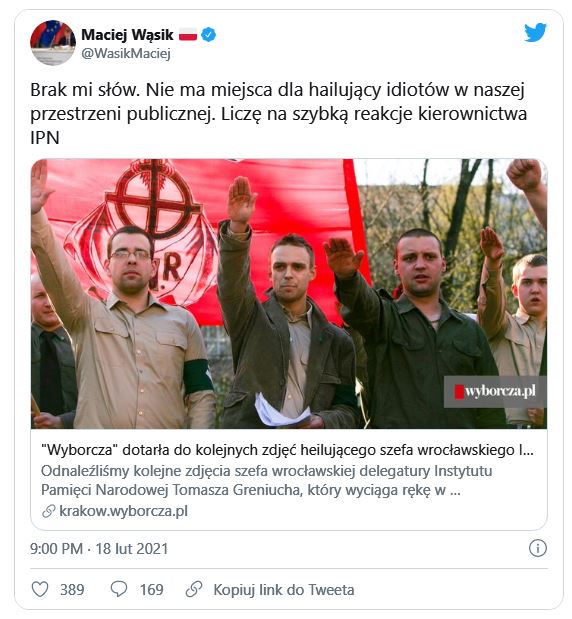A controversy broke out in Poland after February 9, when the Institute of National Remembrance (IPN) appointed Tomasz Greniuch, a historian and former activist of the nationalist organization ONR, as acting director of its branch office in Wrocław.
The ONR, or “national-radical camp”, is considered by many to be a far-right organization with fascist leanings. The liberal and left-wing media immediately took up the case, portraying as almost a neo-Nazi the new director of the regional office of an institute whose role is to investigate and document Nazi and Communist crimes, to prosecute those who committed crimes on behalf of both totalitarianisms in Poland, and to educate the public. It is at the IPN that the files of the former political police – the “Security Service” (SB) – concerning dissidents as well as secret collaborators of the communist era are kept. These files can sometimes be compromising, especially for former secret informers of the SB who now hold public office and who have lied in their statement about their past.
The Israeli embassy immediately reacted to the appointment made by the IPN’s president by expressing its astonishment and inviting Dr. Tomasz Greniuch to visit the Auschwitz museum “whose mission is to remind the whole world of the dangers of Nazi ideology.”
Founded in 1993, the ONR openly follows in the tradition of the pre-war organization of the same name, which was characterized by its anti-Semitism, sympathy for Italian fascism and, at least among some of its members, fascination with Hitler. This did not, however, prevent many of its former members during the Second World War from actively fighting against the German occupiers and even, in some cases, risking their lives to save Polish Jews. The contemporary ONR has not, at least officially, taken up the pre-war anti-Semitism and fascist inspiration. It defines its members as Christian nationalists “committed to values such as God, honor, homeland, family, tradition and friendship” (according to the ONR website), and claims its role-models to be the pre-war National Democratic leader Roman Dmowski and figures of Polish nationalism killed by the Nazis. The ONR is one of the nationalist organizations that co-organize the Independence March, which takes place every November 11 in Warsaw.
However, some local ONR-affiliated groups have been criticized for sometimes organizing skinhead-like youth parades with military fatigues, brown shirts and armbands decorated with the ONR logo.
As for historian Tomasz Greniuch, he is accused of having defended in the past the salute with the right arm outstretched, on the grounds that it was a Roman practice before becoming a fascist or Nazi salute, and especially of having appeared in a photo taken in 2007 performing that salute in Krakow, accompanied by fellow ONR members who looked more like SAs of the 1930s than Romans of antiquity.
Greniuch had to defend himself with a statement in which he claimed he had never been a Nazi and apologized for having performed the salute, which he described as a youthful error. In his statement, he said that his family had suffered under both Nazi and communist totalitarianism, and that he had never meant to glorify such totalitarianism by his behavior. In the same press release, the IPN gave details of members of Tomasz Greniuch’s family who had died or been persecuted at the hands of the Nazis and the Communists.
However, this press release was not enough. When the controversy broke out, President Andrzej Duda criticized the historian’s appointment, even though he had awarded him the Bronze Cross of Merit in 2018 for his work in popularizing knowledge about the “cursed soldiers”, those Polish partisans who continued the fight after 1945 by turning their weapons against the Soviet occupiers after having fought the German occupation. But according to Deputy Minister of Culture Jarosław Sellin, who also described the appointment as a mistake by the IPN president, President Duda was not aware of the historian’s past when he presented him with that decoration. Maciej Wąsik, Secretary of State at the Ministry of the Interior, was even more forthright. Commenting on Twitter on a 2007 photo of Tomasz Greniuch with his right arm outstretched, he said: “I don’t have strong enough words. The idiots who make the ‘Heil Hitler’ gesture have no business in our public space. I am counting on a quick reaction from the IPN management.”

On February 22, IPN president Jarosław Szarek announced the resignation of Tomasz Greniuch from the position of director of the office of Wrocław, but it is now Szarek’s own head that is being asked for, while voices are being raised calling on Greniuch to stop working as a historian at the IPN. The liberals of the Civic Platform (PO) are now taking up the old demand of the post-communist left by demanding the dissolution of the IPN. Ryszard Terlecki, head of the PiS group in the Sejm and Deputy Marshal (Deputy Speaker) of the lower house of the Polish Parliament, said he had been opposed to the appointment of Tomasz Greniuch as IPN director from the outset, but added after his resignation: “I now think that the civil servants, the public figures who were for example in the PZPR [the former Polish Communist Party] should resign just like this gentleman who was in the ONR did. The communist system was at least as criminal as Hitlerism, and maybe even more so.”




